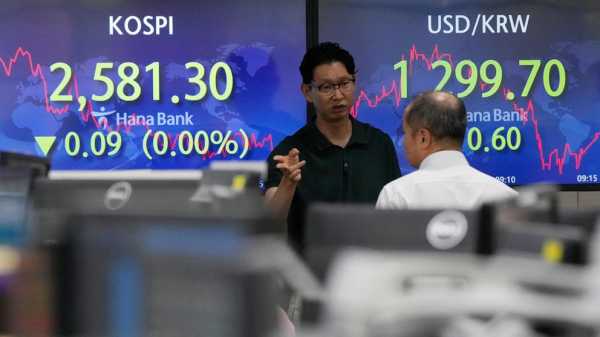
TOKYO — Asian shares were mixed on Wednesday despite a rally on Wall Street driven by optimism over reports suggesting the American economy is in better shape than feared.
Australia's benchmark S&P/ASX 200 jumped 1.1% to 7,194.00 after the government reported that the consumer price index rose 5.6% in the twelve months to May. The most significant price rises included housing and food. The Reserve Bank of Australia made a surprise move of raising interest rate earlier this month to counter persisted price pressures.
Japan's benchmark Nikkei 225 gained 1.5% in afternoon trading to 33,029.73. South Korea's Kospi lost 0.7% to 2,562.72. Hong Kong's Hang Seng fell 0.3% to 19,083.80, while the Shanghai Composite dipped 0.7% to 3,167.36.
Wall Street rallied, with the S&P 500 resuming an upward climb that had carried it earlier this month to its highest level in more than a year. It gained 1.1% to 4,378.41. The Dow Jones Industrial Average rose 0.6% to 33,926.74, while the Nasdaq composite gained 1.6% to 13,555.67.
Airlines helped lead the way after Delta Air Lines said it still sees pent-up demand in the pipeline as passengers make up for lost opportunities to travel during the pandemic. It highlighted high-income customers in particular, who account for three-quarters of spending on air travel and still look to be in good financial shape despite high inflation.
Delta’s stock took off by 6.8%, American Airlines climbed 5.5% and United Airlines rose 5.1%.
Big tech stocks were also strong, continuing a big run this year spurred by excitement around artificial-intelligence technology. Nvidia, which has been at the center of the AI frenzy, rose 3.1% to vault its gain for the year so far to 186.5%.
High inflation is hurting other companies more directly, though. Walgreens Boots Alliance dropped 9.3% after it reported weaker profit for the latest quarter than analysts expected.
Reports on the U.S. economy Tuesday were largely stronger than expected. A reading on consumer confidence jumped to its highest level since the start of 2022, and orders for long-lasting manufactured goods unexpectedly grew, beating economists’ forecasts for a pullback.
Sales of new homes in May also topped economists’ expectations, which sent stocks of homebuilders climbing. Lennar rose 4.1% and Toll Brothers rose 3.3%.
Such data will feed into decisions by the Federal Reserve and other central banks about whether to keep cranking interest rates higher. High rates can undercut inflation, but they also can slow the entire economy, raising the risk of a recession.
Christine Lagarde, the head of the European Central Bank, warned Tuesday that inflation is declining slowly and pledged to raise rates high enough “to break this persistence.” She once again made it seem nearly certain the central bank will raise rates again in July.
That’s also the expectation for the Federal Reserve. But the hope on Wall Street is that a hike next month could be the final one for the Fed, even if it has suggested recently that it could raise rates twice more this year.
In the bond market, the yield on the 10-year U.S. Treasury rose to 3.76% from 3.72% late Monday. It helps set rates for mortgages and other important loans.
The two-year Treasury yield, which moves more on expectations for the Fed, rose to 4.76% from 4.74%.
In energy trading, benchmark U.S. crude added 21 cents to $67.91 a barrel in electronic trading on the New York Mercantile Exchange. Brent crude, the international standard, rose 27 cents to $72.53 a barrel.
In currency trading, the U.S. dollar edged down to 143.99 Japanese yen from 144.02 yen. But the recent rise of the dollar against the yen is raising speculation about how that could affect policy makers, as well as what it could mean for the economy at a time when inflationary pressures have picked up after years of deflation. The euro cost $1.0949, down from $1.0959.
——
Yuri Kageyama is on Twitter https://twitter.com/yurikageyama
Sourse: abcnews.go.com






